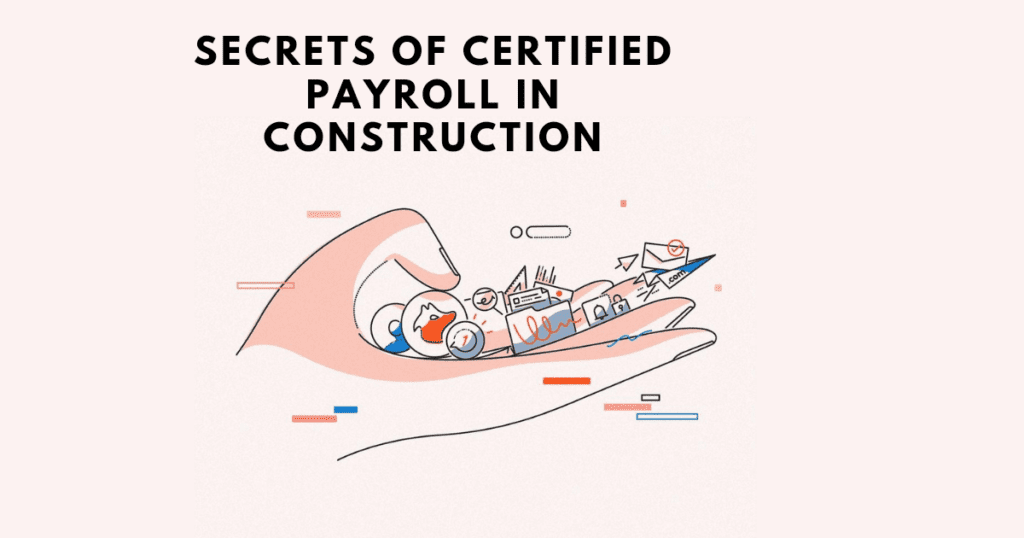Certified Payroll is crucial for ensuring fair wages for construction workers and compliance with labor laws. Employers must provide detailed reports on employee salaries, hours worked, and other critical data.
Certified Payroll is an integral component of the construction industry, ensuring workers receive fair wages and employers abide by labor laws. Its significance cannot be overemphasized, as noncompliance can lead to costly fines and legal action.

This article covers the basics of Certified Payroll in construction, including its definition, benefits, requirements, and resources for compliance. By the end, you’ll have a comprehensive understanding of why Certified Payroll compliance is crucial.
Key Takeaways
- Certified Payroll is critical in construction for ensuring fair wages for workers and compliance with labor laws.
- Employers are required to provide detailed reports on employee salaries, hours worked, and other critical data to maintain certification and must submit a Certified Payroll report to relevant government agencies at the end of each pay period.
- Certified Payroll benefits workers, employers, and government agencies by promoting fair compensation, compliance, and monitoring of workers’ rights.
- Requirements for Certified Payroll guarantee fair wages for construction workers with federal and state regulations. Non-compliance penalties can be significant, including fines, lawsuits, and suspension or debarment from public projects.
- Resources are available for businesses and workers to ensure compliance with Certified Payroll requirements, including government agencies and organizations providing assistance.
Use the software to manage the whole Payroll process
What is Certified Payroll?
Here is an informative explanation of Certified Payroll, its role in the construction industry, and who must submit reports to maintain certification:
Certified Payroll ensures fair wages for construction workers and compliance with labor laws, with employers submitting detailed reports on pay rates, hours worked, and other information. It’s critical to maintaining a fair working environment for both workers and employers.
Employers in construction projects must keep accurate records of employee hours and wages, including overtime and deductions. They must submit a Certified Payroll report to the government agency at the end of each pay period.
Certified Payroll reports are submitted to federal and state agencies, such as the Department of Labor and Industries, in order to guarantee workers are paid in accordance with labor laws. Furthermore, these reports serve to monitor prevailing wage laws which mandate workers on public construction projects receive wages that meet industry standards.
In conclusion, Certified Payroll is an essential system in the construction industry that guarantees workers receive fair wages and adhere to labor laws. Employers must maintain accurate records and submit Certified Payroll reports to relevant government agencies.
Benefits of Certified Payroll
Here’s an explanation of the advantages of Certified Payroll for workers, employers, and government agencies:
- Certified Payroll guarantees fair wages for construction workers and compliance with labor laws by requiring detailed reporting of employee information.
- Certified Payroll helps employers avoid penalties and legal action by ensuring accurate record-keeping and adherence to labor regulations.
- Certified Payroll provides government agencies with data to enforce labor laws and monitor prevailing wage rates.
- Certified Payroll benefits workers, employers, and government agencies by promoting fair compensation, compliance, and monitoring of workers’ rights.
Requirements for Certified Payroll
Here’s an informative explanation of the requirements for Certified Payroll, including federal and state requirements, information that needs to be included in a Certified Payroll report, as well as penalties for non-compliance:
Certified Payroll requirements guarantee fair wages for construction workers with federal and state regulations. Employers must submit reports with detailed worker information, such as job classification, hours worked, pay rates, and deductions.
The Davis-Bacon Act outlines federal requirements for Certified Payroll, mandating that contractors and subcontractors on federal government projects pay their workers prevailing wages and fringe benefits. States have their own regulations, with most requiring Certified Payroll reports for all public works projects.
Non-compliance penalties for Certified Payroll requirements can be significant, including fines, lawsuits, and suspension or debarment from public projects. Employers who fail to submit accurate reports or pay the prevailing wage rate may face severe financial and legal consequences.
Compliance with Certified Payroll requirements is crucial for ensuring fair pay and labor law adherence in construction. Employers must submit detailed reports or face serious legal repercussions.
How to Complete a Certified Payroll Report
Here is an engaging explanation of how to complete a Certified Payroll report, including a step-by-step guide and common mistakes to avoid:
Completing a Certified Payroll report can be an intricate task, but it’s vital for guaranteeing construction workers receive fair wages and follow labor laws. Here’s our step-by-step guide on completing your Certified Payroll report:
Step 1: Gather all pertinent information about your workers, such as their names, job classifications, hours worked and rates of pay – plus any deductions taken from their pay.
Step 2: Calculate each worker’s gross pay, which is equal to their number of hours worked multiplied by their hourly rate.
Step 3: Subtract any authorized deductions from your gross pay, such as taxes, social security or retirement contributions.
Step 4: Calculate the total pay for each worker by adding any additional benefits or fringe benefits they may have received.
Step 5: Enter all necessary data into a Certified Payroll report, such as the job name, project number, pay period and names and addresses of all workers.
Step 6: Double-check all calculations and information for accuracy and completeness.
Resources for Certified Payroll Compliance
Here is an engaging overview of resources available for businesses and workers to ensure compliance with Certified Payroll requirements, including government agencies and organizations providing assistance:
Businesses and employees have access to a range of resources for Certified Payroll compliance. These tools are intended to assist employers in understanding their obligations, while giving workers the necessary info and tools to protect their rights.
One of the primary resources available for Certified Payroll compliance is the United States Department of Labor (DOL). The DOL offers guidance and support to businesses and employees alike, including instructions on completing Certified Payroll reports as well as resources to resolve wage/hour disputes.
Additionally, many state and local governments provide resources and assistance for businesses and workers alike. For instance, the California Labor Commissioner’s Office provides guidance on California’s prevailing wage requirements as well as compliance with state labor laws.
Other organizations such as industry trade associations and labor unions offer resources and support for Certified Payroll compliance. They can offer training, tools, and other materials to businesses and workers to ensure they abide by labor laws and receive fair wages for all workers.
In conclusion, businesses and workers can access resources from government agencies, industry trade associations, and labor unions to ensure compliance with Certified Payroll requirements and protect their rights.
Future of Certified Payroll in Construction

Potential changes to Certified Payroll requirements may impact how employers complete Certified Payroll reports and require increased attention to detail and accuracy. New regulations governing the use of technology for reporting may also be introduced.
Advancements in technology could make Certified Payroll reporting more efficient and accurate, streamlining the reporting process and reducing the administrative burden on employers. However, data privacy and security concerns must be addressed.
Employers must stay informed of any changes to Certified Payroll requirements and ensure they comply with all labor laws to safeguard their workers’ rights and protect their business from potential legal action.
The Bottom Line
In conclusion, Certified Payroll is an integral system in the construction industry that guarantees workers receive fair wages and benefits in accordance with state and federal labor laws. By requiring employers to submit detailed reports, Certified Payroll helps build trust between employers and workers, avoids legal action, and guarantees compliance with labor regulations.
As we move into 2023, businesses and employees must prioritize compliance with Certified Payroll requirements. This involves accurate record-keeping and reporting, staying abreast of changes in requirements and technology advances, as well as protecting workers’ personal information from unauthorized access.
Overall, Certified Payroll compliance is essential for promoting fair compensation, creating trust between employers and workers, and safeguarding workers’ rights in the construction industry. By prioritizing compliance, businesses and workers can create a healthier and more equitable workplace in years ahead.



Very interesting details you have mentioned, thank you for
putting up.Leadership